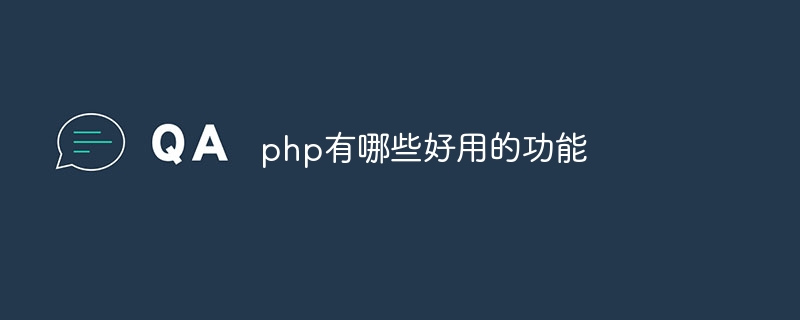
The useful functions of php include database connection, form processing, image processing, file processing, user authentication and authorization, caching, data formatting, error handling and debugging, security, third-party integration, etc. Detailed introduction: 1. Database connection function, by using built-in database extensions or third-party libraries, developers can easily perform operations such as database queries, insertions, updates, and deletions; 2. Form processing function, for form validation and data processing, PHP provides a wide range of built-in functions and libraries; 3. Image processing functions, etc.

The operating system of this tutorial: Windows10 system, PHP version 8.1.3, DELL G3 computer.
PHP is a popular open source scripting language widely used for web development. It has many features that help developers code more efficiently and build more powerful applications. This article will introduce some common functions in PHP.
1. Database connection: PHP provides the ability to connect and interact with most mainstream databases (such as MySQL, Oracle, SQL Server, etc.). By using built-in database extensions or third-party libraries, developers can easily perform operations such as database queries, inserts, updates, and deletes.
2. Form processing: PHP's form processing function is very powerful. Developers can use PHP to write scripts to validate user-submitted form data and take appropriate actions. For form validation and data processing, PHP provides a wide range of built-in functions and libraries.
3. Image processing: PHP has many image processing functions that enable developers to dynamically generate and process images. Using the GD library, developers can generate thumbnails, resize images, add watermarks, and more. This is useful for building image uploading and processing functionality.
4. File processing: PHP allows developers to read and write files. You can use PHP to create, open and close files, write or read data, and perform other file processing operations. This makes working with files in web applications very easy.
5. User authentication and authorization: PHP provides built-in user authentication and authorization functions, allowing developers to easily manage user login and access rights. By using session management and secure password hashing algorithms, developers can build secure user authentication systems.
6. Caching: PHP supports various caching mechanisms, such as memory caching, file caching and database caching. Using caching can improve application performance and reduce access to databases or other external services.
7. Data Formatting: PHP has built-in functions for processing and formatting various data formats. Developers can use these functions to parse and generate JSON, XML, CSV and other data formats to implement data exchange and processing.
8. Error handling and debugging: PHP provides a wealth of error handling and debugging tools. Developers can set error reporting levels, catch and handle exceptions, log errors, and debug code through the debugger.
9. Security: PHP has some security features that enable developers to protect applications. For example, PHP supports protection against common web attacks such as cross-site scripting (XSS), cross-site request forgery (CSRF), and SQL injection.
10. Third-party integration: PHP has a rich set of third-party libraries and frameworks that help speed up the development process. For example, developers can use popular PHP frameworks like Laravel, Symfony, CodeIgniter, etc. to build powerful web applications.
To summarize, PHP has many useful features that make it easier for developers to build powerful web applications. Whether interacting with databases, processing form data, processing images, or performing user authentication and authorization, PHP provides a wealth of functions and tools. In addition, PHP has many security and debugging features, as well as a rich set of third-party libraries and frameworks, making the development process more efficient and easier.
The above is the detailed content of What are the useful functions of php?. For more information, please follow other related articles on the PHP Chinese website!